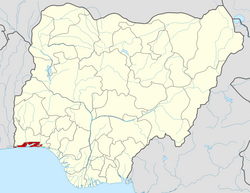| Lagos prison break | |
|---|---|
 | |
| Location | Lagos State, Southwestern Nigeria |
| Date | 10 October 2014 |
| Target | Kirirkiri Medium Prison |
Attack type | Prison escape |
| Deaths | 2 |
| Injured | 32 |
| Perpetrators | Convicted inmates |
No. of participants | Unknown |
| Defenders | 5 prisoners escaped |
The Lagos Prison Break occurred on October 10, 2014, when five persons (Ayodeji Bello, 32, Saibu Abdul Razak, 21, Adebayo Dada, 24, Desmond Issac 35 and Peter Kingsley, 29) escaped from the Kirikiri Medium Prison. [1]